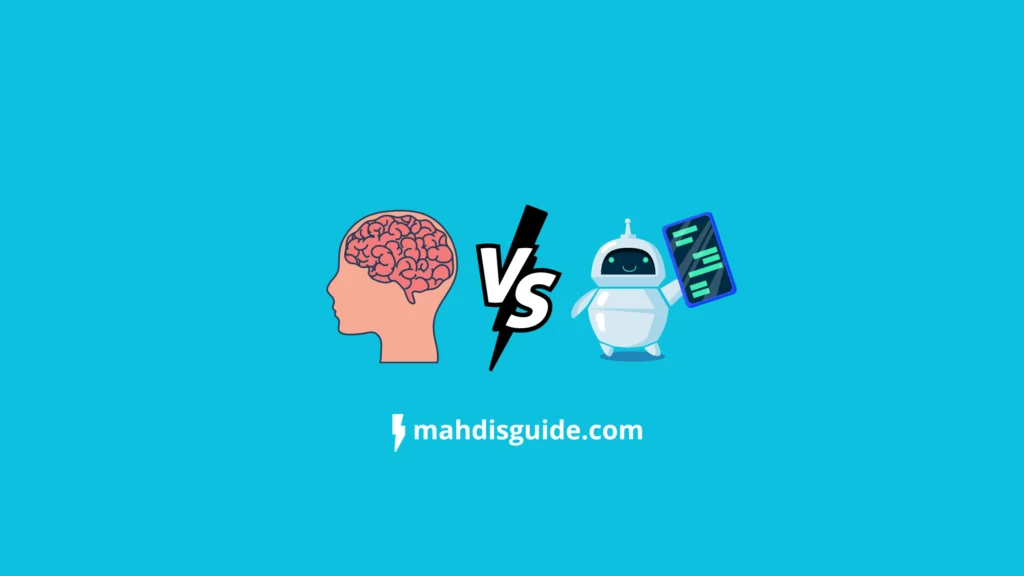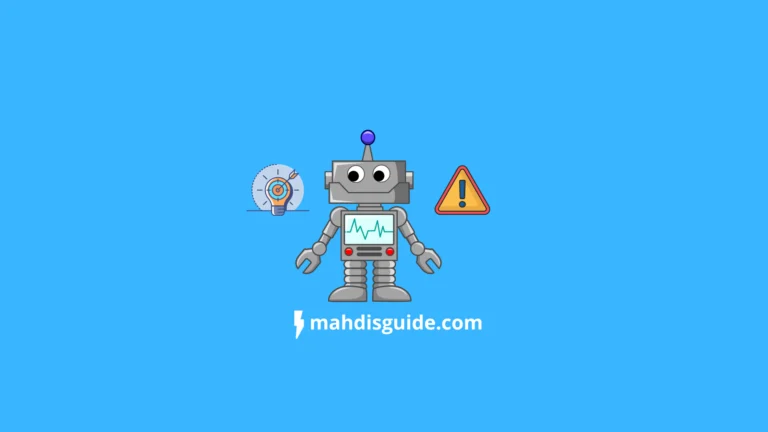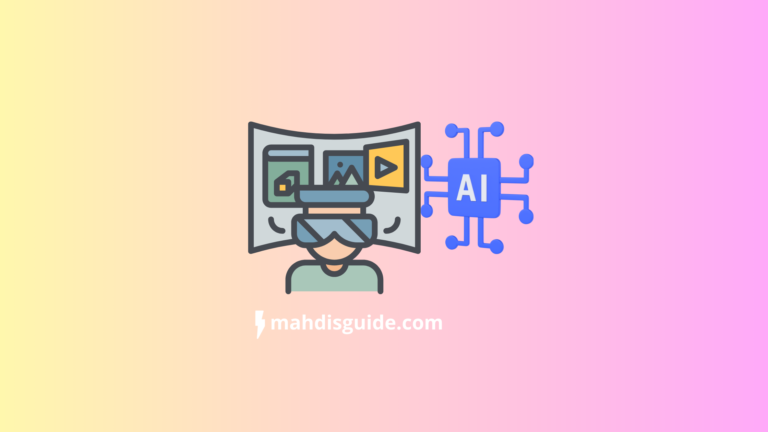Artificial Intelligence vs Human Intelligence
Introduction
Since the beginning of time, the fields of artificial intelligence (AI) and human intelligence have been the focus of a great deal of enthusiasm, discussion, and investigation. In light of the fact that technological developments are driving artificial intelligence to new heights, it is becoming increasingly important to analyze the basic differences that exist between human and artificial intelligence. In this essay, we look into the various qualities, capacities, and limitations that distinguish these two types of intelligence from one another from one another. So let’s discover Artificial intelligence vs Human Intelligence.

1. Origins and Foundations
Human Intelligence
The confluence of evolutionary processes, intricate biological systems, and the intricacy of the human brain is what we refer to as human intelligence. Human intelligence refers to a combination of genetic predispositions, environmental effects, and the amazing plasticity of the brain. Its origins can be traced back to billions of years of evolution. The capacity to navigate the social terrain, as well as the ability to experience and express emotions. All these human abilities are essential components of human intelligence.
Artificial Intelligence
Artificial intelligence, on the other hand, is the result of human intervention and intellect and is created via the use of algorithms, data, and processing power. The mathematical models, programming languages, and machine learning techniques that form the basis of artificial intelligence are the foundations. Artificial intelligence (AI) is modeled after the human brain, but it does not have the biological intricacies that shape human capabilities. The origins of artificial intelligence are profoundly anchored in human activity, which stands in stark contrast to the organic evolution that was responsible for shaping human intelligence.
2. Learning and Adaptability
Human Intelligence
Human intelligence is characterized by a profound capacity to learn from experiences, adapt to novel situations, and exhibit cognitive abilities. The human brain’s neural networks constantly rewire themselves, forming new connections and strengthening existing ones. This adaptability is evident in the way humans can acquire diverse skills, learn languages, and navigate complex social dynamics.
Artificial Intelligence
AI, on the other hand, relies on programmed algorithms and learning models. Machine learning algorithms enable AI systems to recognize patterns, make predictions, and improve performance over time. While intelligent machines excel in tasks with well-defined parameters, they lack the intuitive understanding and adaptability inherent in human intelligence. Human learning often involves grasping abstract concepts, contextual understanding, and emotional intelligence—facets that remain challenging for AI to fully replicate.
3. Emotional Intelligence
Human Intelligence
Emotional intelligence is a cornerstone of human cognition, encompassing the ability to perceive, understand, manage, and utilize emotions effectively. Humans can decipher facial expressions, interpret subtle cues, and navigate intricate social landscapes. Empathy, a quintessential aspect of emotional intelligence, enables humans to connect with others on a deeply emotional level.
Artificial Intelligence
While AI has made strides in recognizing and generating emotions through facial recognition and deep learning, it lacks the genuine emotional experience and understanding that humans possess. The nuanced interplay of emotions, empathy, and complex social intelligence dynamics remains a frontier that AI is only beginning to explore.
4. Creativity and Imagination
Human Intelligence
Human intelligence thrives on creativity and imagination, allowing individuals to envision possibilities beyond the present and create novel solutions to complex problems. The human mind can synthesize information, draw connections between seemingly disparate ideas, and generate innovative concepts across various domains.
Artificial Intelligence
AI, while capable of generating creative outputs within predefined frameworks, lacks the innate ability to truly imagine beyond its programming. Creative endeavors often involve a level of intuition, abstract thinking, and a deep understanding of human emotions, elements that AI struggles to replicate authentically. The essence of creativity and the spark of human imagination remain elusive for artificial systems.
5. Consciousness and Self-Awareness
Human Intelligence
Consciousness is a hallmark of human intelligence, encompassing self-awareness, subjective experiences, and the ability to introspect. Humans possess a sense of identity, an awareness of their existence, and the capacity to reflect on their thoughts and actions—a dimension that transcends the computational capacities of artificial systems.
Artificial Intelligence
Artificial intelligence operates without consciousness or self-awareness. While AI can simulate awareness to a certain extent through programmed responses and data processing, it lacks true subjective experiences. The distinction lies in the depth of self-awareness that humans possess, shaping their beliefs, values, and the intricate tapestry of their inner worlds.
6. Ethical Considerations
Human Intelligence
Ethical considerations in human intelligence involve a complex interplay of cultural, social, and moral frameworks. Human decisions are often influenced by a range of factors, including empathy, moral values, and an understanding of societal norms. The ethical dimensions of human actions are deeply ingrained and subject to continuous evolution.
Artificial Intelligence
The ethical considerations surrounding AI revolve around programming biases, algorithmic transparency, and the potential impact of AI on employment, privacy, and societal structures. Ensuring ethical AI involves addressing biases in data, promoting transparency in algorithms, and establishing frameworks for responsible AI development. Unlike humans, AI systems lack an intrinsic moral compass and must rely on ethical guidelines set by their human creators.
7. Limitations and Challenges
Human Intelligence
Human intelligence, while remarkable, is not without limitations. Cognitive biases, susceptibility to emotions, and the constraints of biological evolution contribute to the fallibility of human decision-making. Additionally, the human brain has finite processing capacities, constraining the speed and efficiency of certain cognitive tasks.
Artificial Intelligence
AI faces challenges related to explainability, interpretability, and the potential for biased decision-making. The “black-box” nature of some AI models raises concerns about accountability and the need for transparency in algorithmic decision-making. Moreover, AI systems may struggle with tasks that require common sense, intuition, and a deep understanding of real-world contexts.
Conclusion
In conclusion, the distinctions between artificial intelligence and human intelligence are profound and multifaceted. While AI excels in specific tasks, leveraging computational power and data-driven approaches, it falls short in replicating the holistic, adaptive, and deeply emotional nature of human intelligence. The ongoing synergy between these two realms holds promise for the future, with ethical considerations guiding the responsible development and deployment of artificial intelligence. Understanding the differences is not just an academic exercise but a crucial step toward navigating the evolving landscape where machines and humans collaborate and coexist.







